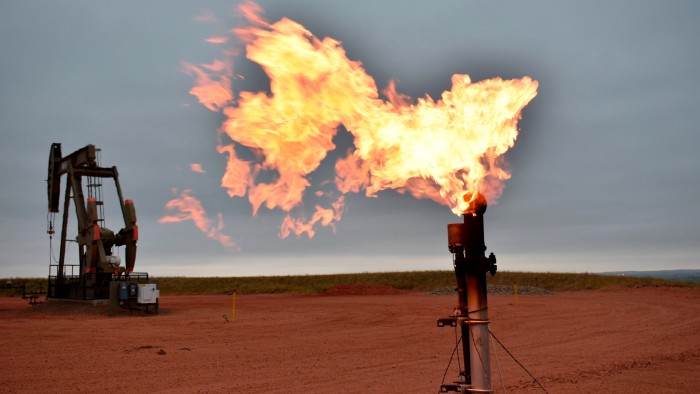This article is an on-site version of our Europe Express newsletter. Premium subscribers can sign up here to get the newsletter delivered every weekday and fortnightly on Saturday morning. Standard subscribers can upgrade to Premium here, or explore all FT newsletters
Good morning. News to start: Viktor Orbán has allegedly pumped more than €1bn in unlawful subsidies into pro-government media, according to a state aid complaint seen by the Financial Times, heightening concerns over the illiberal Hungarian premier’s grip on power.
Today, our energy correspondent reports on headaches with EU gas rules that could imperil efforts to sign new US import contracts, and one of the bloc’s auditors tells our tech correspondent why Brussels’ industrial policy so often fails to make an impact.
Pipe dream
Major EU importers of gas have said that the bloc’s new rules to cut methane emissions are complicating contract negotiations, just as the bloc tries to wrap increased energy purchases into a trade deal to appease US President Donald Trump, writes Alice Hancock.
Context: The EU adopted stringent rules to cut methane emissions in 2024. Methane, which often leaks from gas infrastructure, is 80 times more polluting than carbon dioxide during the 20 years after it is released, and a significant contributor to climate change. Fixing methane leaks is seen as one of the most achievable climate policies.
Under the EU methane rules, fuel importers must monitor and report their methane emissions or face fines. Other countries’ rules can be deemed “equivalent”, but few have a framework as strict as the EU’s.
In a letter to the European Commission sent today, gas companies including BP, Equinor and Uniper have said that “unresolved uncertainties” in the law concerning importers’ reporting requirements are “already disrupting contract negotiations and risking the EU’s energy security”.
The companies, which will face fines of 20 per cent of annual turnover for non-compliance, have said that the commission must take “urgent action” to clarify the rules. Otherwise they will “further limit Europe’s ability to attract diverse and reliable gas supply”. Companies are due to make their first reports in May.
The statement comes as the EU is in the process of finalising a plan for how to wean itself off Russian fossil fuels. A senior EU official said that the document would contain various legal options for how companies could break their Russian contracts.
Brussels favours buying more US LNG as a way to fill any gap left by cutting out the last Russian imports, and Brussels has said it is happy to comply with Trump’s demands that the EU buy more US fossil fuels as a way to bridge its goods trade deficit with the US.
Trump shook hands with commission president Ursula von der Leyen at Pope Francis’ funeral on Saturday, and the two used a brief exchange to agree to a meeting, her spokesperson said without providing details.
But Trump has also moved to scrap US rules around reporting methane emissions, complicating any efforts to deem US methane rules equivalent in order to smooth imports.
Chart du jour: Crumbling courts
After years of underfunding in justice systems across Europe, the continent is grappling with a crisis in its courts.
Chipping away
Scattered funding and competences complicate the EU’s attempts to implement an effective industrial policy, European auditor Annemie Turtelboom tells Barbara Moens.
Context: Boosting competitiveness through industrial strategy is a key priority for the European Commission, as the single market struggles with trade wars, lagging investment and remaining internal barriers.
The European Court of Auditors is due to publish an audit report on the EU’s strategy for microchips today, after having already scrutinised a number of other key industrial areas such as 5G, renewable hydrogen, batteries and artificial intelligence.
The chips strategy is Brussels’ attempt to secure supplies of the semiconductors that drive today’s global economy, and will be closely studied by the EU’s tech chief Henna Virkkunen, who is preparing more legislation in that field.
But the bloc has structural obstacles in achieving its industrial policy goals, including on chips, said Turtelboom, who led the audit.
“What we see throughout all our reports is that the funding is scattered. The targets are ambitious and almost never achievable,” Turtelboom said. “And then there are the widely spread responsibilities that also don’t make it easy for the commission to steer the strategy.”
The different competences shared between national and EU authorities often make it difficult for Brussels to achieve its industrial policy goals, as it can only nudge European capitals, according to the auditors.
“The commission can stimulate, can try to influence, can provide some funding and can set aspirational targets,” Turtelboom said.
It is then up to European capitals to realise those targets, who sometimes have different political priorities — even though all European leaders agree on the need to boost the European economy, she said.
What to watch today
-
Foreign ministers from Nordic and Baltic countries as well as Germany, France and Poland to meet in Denmark.
-
Informal meeting of EU environment ministers in Warsaw
Now read these
Recommended newsletters for you
Free Lunch — Your guide to the global economic policy debate. Sign up here
The State of Britain — Peter Foster’s guide to the UK’s economy, trade and investment in a changing world. Sign up here
Are you enjoying Europe Express? Sign up here to have it delivered straight to your inbox every workday at 7am CET and on Saturdays at noon CET. Do tell us what you think, we love to hear from you: [email protected]. Keep up with the latest European stories @FT Europe
